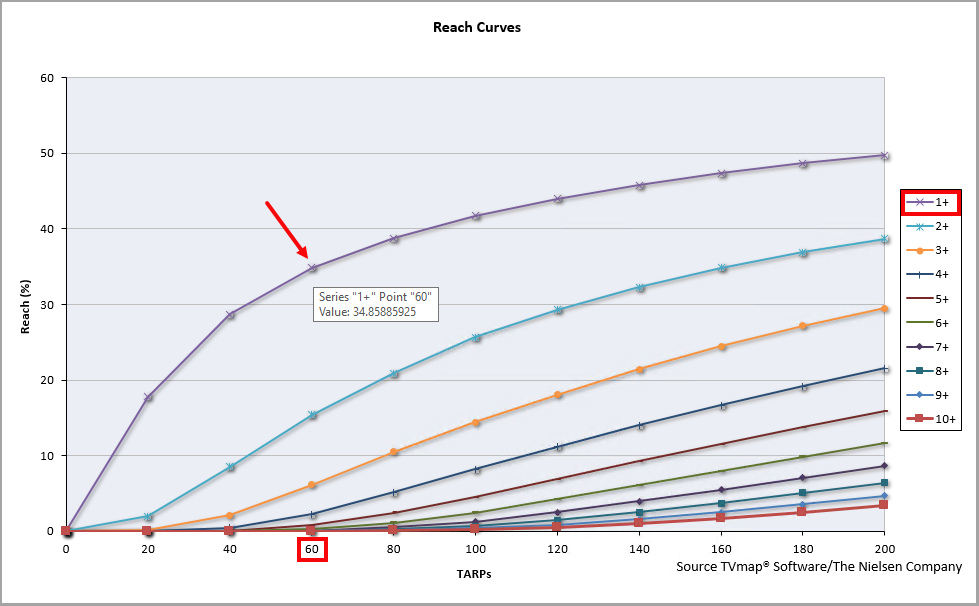___________________________________________________________________________________________
Contents
How is the resulting curve calculated?
Can I run a Reach and Frequency over large date ranges?
What does the “No of Prog” column show?
How long should a reach curve take to run?
Why are there multiple Range fields in the date section?
Why do all my Reach Curves schedules seem to "Top-Out" at 2000 Spots?
___________________________________________________________________________________________
How is the resulting curve calculated?
It uses the average value of the schedules.


What does it mean if a curve with a Max TARP of 1000 stops before it gets to 1000?
It means that with parameters you've selected, TVmap could only book spots up to the level shown.
To rectify this, you’ll need to look to change some of the parameters to allow more spots to be booked/selected.
Check the number of programmes in each daypart and the % of spots by daypart channel.
For example:
▪Introducing an additional daypart/Expanding a daypart
▪Changing the daypart split
▪Increasing the maximum number of spots in for each programme
▪Increasing the date range
Can a Reach and Frequency be run over large date ranges?
The Gold Standard R&F calculation does not preclude running an R&F over a large date range, however from a practical perspective there is a good reason not to do this.
R&F does not “forget” spots – but people do.
For example, when calculating R&F spots booked in Shortland Street in February and in November, then this will be considered as a 2+ view if the same person watches both episodes. The likelihood of a user remembering the spot between first seeing it in February and then again in November is pretty low so it’s probably better to limit the R&F range to 2-3 months and run multiple runs across a year to see seasonal effects.
What do the “No of Prog” columns show?
There are two No of Prog columns, one in the Channels section, the other the Dayparts section. These are updated when the Run button is clicked.
Channels
For the specific channel, it indicates the number of programmes available to be booked into based on the other parameters entered.

Daypart
For the specific daypart, it indicates the number of programmes that could be booked into for the range selected.
Sometimes with daypart selections this number can be low so it becomes difficult to achieve the target because the reach curve run is over constrained.

How long should a reach curve take to run?
This is very hard to quantify as it is dependent upon the parameters selected, and the infrastructure hosting TVmap.
If you’re unsure if the run will take a long time to complete, we suggest doing some “warm-up” runs.
Eg:
TARP maximum = 1000, TARP increment = 100 and number of schedules = 5.
If it runs then increase TARPs to 1500 and see if it still returns results and then go to 2000.
Why are there multiple Range fields in the date section?
You will notice there are multiple Range fields where the date section is - Range 1, Range 2, Range 3 and Range 4
These fields are to allow you to exclude dates from the reach run. Having four ranges allows you to specify up to 3 exclusions.
If you wanted to run against 07-Sep-2018 to 13-Oct-2018 but know that a “special event” occurred between 20-27 Sept (eg: Commonwealth Games) then you might want to select around that period.

With the date ranges specified, TVmap will randomly book spots within the allowable date ranges. Using reach curves it’s not possible to control the proportion of spots booked in each date range.
If you need this level of control then use the Schedule Optimiser in the Buying Module of TVmap.
Why do all Reach Curves schedules seem to "Top Out" at 2000 Spots?
Currently the Schedule Page display output is limited to 2000 spots. This is only the schedule display - the reach curve still completes.

* Excel® is a registered trademark of Microsoft Corporation
Have more questions? E-mail us: support@tvmap.com or call us: +64 9 304 0762
|
|
©2025 Broadcast M.A.P. Limited. All Rights Reserved.
|